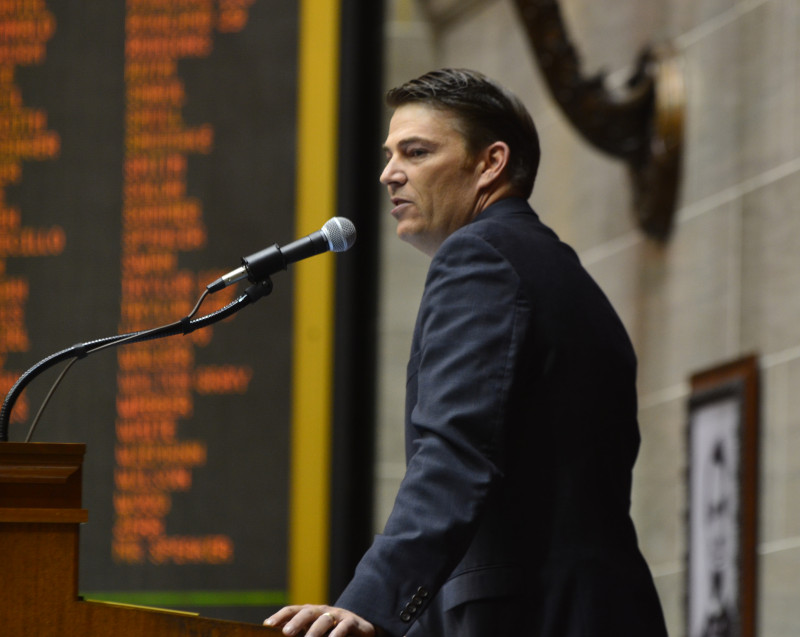JEFFERSON CITY, Mo. – Last week, Gov. Jay Nixon vetoed one of General Assembly Republicans’ top priorities for this session: the so-called “paycheck protection” bill.
HB 1891, sponsored and championed by Rep. Holly Rehder, R-Sikeston, would make it so public employees have to opt-in to any system from a public union in which dues are collected by garnishing wages. Rehder believes that her legislation will stop a union member’s money from funding causes or movements with which they do not necessarily agree.
“Paycheck protection simply ensures the hard-earned dollars of these workers are in their control, and that the union representative isn’t guaranteed a member,” Rehder said shortly after the bill passed through the House in mid-February.
The bill has been opposed by unions and accused of being a watered down version of last year’s Right-to-Work bill or else a slippery slope back to that type of legislation. The measure has been sharply rebuked by House Democrats and some union supporters within the Republican ranks, and Senate Democrats even held a seven-hour long mini-filibuster in opposition to the legislation in February. Nixon was just as adamant in his veto letter, arguing that it created further hurdles for unions and union members while ultimately “undermining public labor organizations.”

Rep. Eric Burlison, R-Springfield, has been an outspoken supporter of the bill, among other union-opposed measures. He said the bill guaranteed a basic right.
“It’s really a sad commentary and a far cry from where we have been as a nation, where even Democratic leaders like FDR opposed collective bargaining of public employees,” Burlison said. “We just want to give people the right to have some say before their money is spent on political campaigns. I think opposing that is really opposing individual free speech.”
The Americans for Prosperity concurred, arguing that the veto showed Nixon is “no longer… paying attention to what Missourians want.
“Knowing that the legislation passed with a veto-proof majority, it is clear that the people have spoken,” said AFP-Missouri Deputy State Director Rachel Payton. “Missourians want paycheck protection and our organization will continue to make that clear to legislators. Missourians want more fairness in the workplace and this law would bring us one step closer.”
On the other hand, Democratic gubernatorial candidate Attorney General Chris Koster echoed the sentiments of many of the Democrats opposed to the measure.
“The legislation attempts to pit workers against each other in an effort to drive down wages across the state,” he said in a statement shortly after the governor’s veto. “Attempts to divide Missourians will only make our state weaker and do nothing to grow our economy. Instead of attacking unions, the legislature should focus on economic development opportunities such as expanding healthcare and investing in transportation.”
While the issue is not necessarily settled among those on opposite sides of the aisle, the race to make sure the legislation becomes law by the end of the year moves into full effect
With the bill vetoed, it will now make its way back to the Legislature where it must first go through the House and then the Senate. Thus, Majority Floor Leader Mike Cierpiot, R-Lee’s Summit, and the Republican Caucus now controls its fate.
Assistant Majority Floor Leader Kevin Austin, R-Springfield, said that while the bill was not only a high priority for the party, but for his constituents as well the value may not necessarily mean a swift passage through the two chambers. While he noted the House had the veto-proof majority needed to pass through the body, he noted that the Senate was more unpredictable. However, he was confident it would get done in the coming weeks.
“We have time to do it this session before we leave in May,” he said. “What will effect the timing for veto override will be when we can most effectively do that, when our chances are the best.”
Discussions have not yet taken place between House and Senate Republican leadership due to the timing of the Spring Break, but Austin believes the General Assembly has ample time to pass the legislation, even if they have to hold off until veto session.
Austin intoned though that the bill would likely make it out before the end of regular session in May. While some believe a bill vetoed during the middle session must be passed before the end of session, there is nothing in Missouri statute dictating such a course of action. Burlison said that would be the most likely course of action, and the one that the Republican Caucus should take because veto session can become unpredictable.
Last session, Democrats cried foul when a bill that cut unemployment benefits from 20 weeks to 13 weeks was vetoed, taken up by House during the regular session and failed to get a vote was taken up again during the veto session and eventually passed. Burlison implied that such a scenario would not happen with paycheck protection.
“I am fairly confident it will be overridden before the end of session,” Burlison said. “It’s a lot harder to do a veto override in September because the Caucus communicate with all the members and be on the same page. it’s a lot more difficult when everybody is not in session.”
The bill passed with that veto-proof majority via a slim margin, with Reps. Robert Cornejo and Anne Zerr being the last minute converts to the yes side. Democrats are probably looking to appeal to Republicans that have been more favorable to unions in the past on issues like Right-to-Work. Austin, however, is confident that House Republicans will stick to their guns when it comes time to vote again.
“They’ve already made their vote, and I think they’ll stick around,” he said. “In fact, I think things could go the other way, and we’ll have more ‘yes’ votes.”








